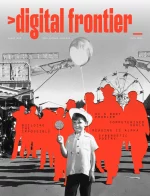Farsight, Issue 15
Shipping Class 2 = 69 SEK
Shipping Class 3 = 89 SEK EUROPE SHIPPING #1 Shipping Class 1 = 100 SEK
Shipping Class 2 = 150 SEK
Shipping Class 3 = 200 SEK EUROPE SHIPPING #2 Shipping Class 1 = 150 SEK
Shipping Class 2 = 200 SEK
Shipping Class 3 = 250 SEK EUROPE SHIPPING #3 Shipping Class 1 = 150 SEK
Shipping Class 2 = 250 SEK
Shipping Class 3 = 350 SEK OUTSIDE EUROPE SHIPPING Shipping Class 1 = 150 SEK
Shipping Class 2 = 250 SEK
Shipping Class 3 = 350 SEK
NOTE: You can buy as many items you want within the same shipping class. Read more » ×
Farsight unpacks the most urgent issues shaping tomorrow, fusing analysis and speculation to spotlight emerging change and challenge assumptions about the future. Insights from our resident futurists are included alongside articles and interviews from an international network of journalists and expert contributors, all brought to life through striking illustration and design. Farsight is published by the Copenhagen Institute for Futures Studies, a non-profit think-tank (NGO) founded with the principle that many futures are always in play, and that future thinking can help us better make sense of them. Farsight helps readers map out these worlds and understand their own agency in shaping the future that they desire.
In this issue:
We know that intelligence and cognition – the foundations of knowledge – can exist in far more forms than once thought.
Alongside the branching tree, we might also picture the swarm intelligence of insects or birds, the subterranean information exchange of the ‘wood wide web’, or slime molds that use techniques akin to machine learning to solve mazes.
Knowledge, too, is no longer bound to singular repositories like books, hard drives, or brains, but are increasingly created and shared in networks of technologies, and often float formlessly in the cloud.
So, what does the future of knowledge look like? In this issue, we take up that question.
We examine the limits of prediction, argue for the return of the polymath, and explore the future of learning and human-machine hybrid knowledge ecologies.
We consider the role of storytelling, alongside science, in making the world more futures literate. We trace the history (and future) of ‘stupidity’ (or rather: warnings of cognitive decline), explore what happens when technology increasingly mirrors biology, and make the case for why the mundane aspects of everyday life hold a missing key to understanding tomorrow.
Related products
-
Business & Current Affairs - Design - Society
The Wired World in 2026
Wired World in 2026 is WIRED’s annual trends briefing, offering a forward-looking snapshot of the ideas, technologies, and cultural shifts set to define the year ahead. This special edition spans 120 pages of expert insights and predictions, curated by leading voices in science, business, technology, and design. The magazine serves as a roadmap for innovators, […]
249 SEK -
 Business & Current Affairs - Culture & Lifestyle - Design - Home & Living - Travel
Business & Current Affairs - Culture & Lifestyle - Design - Home & Living - TravelMonocle, December/January 2025 – Issue 189
Not the Harvard-produced satire of the ’60s, Monocle reports the parts of international affairs, policy, culture and social trends that are relevant to people also interested in furniture design, exotic travel…..
169 SEK -
Technology
Digital Frontier, Issue 5
Introducing an exciting new launch – Digital Frontier– a brand new magazine reporting on technology and culture. Digital Frontier is a physical manifestation of the biggest forces impacting the digital world. It’s filled with deeply reported stories that explore how technology is influencing how we live, work and spend our money, complemented by arresting visuals. […]
295 SEK -
Mind - Photography - Self-Help & Personal Development
New Philosopher, Issue 48 – Feeling Emotional!
For curious people interested in the fundamental issues facing humankind. New Philosopher is an independent publication devoted to exploring philosophical ideas from past and present thinkers on ways to live a more fulfilling life. New Philosopher aims to guide readers into living a happier and freer mode of existence. New Philosopher caters to those who […]
215 SEK

















